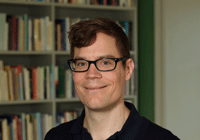
Dirk Meyer
Bernhard Karlgren Fellow, SCAS.
Associate Professor of Chinese Philosophy and Fellow of
The Queen’s College, University of Oxford
Dirk Meyer read Chinese Philology at National Taiwan University,
and later Sinology and Philosophy at
Universität Heidelberg and Leiden University. In 2008, he received his Ph.D. from Leiden
University for
the thesis ‘Meaning-Construction in Warring States
Philosophical Discourse: A Discussion of the
Palaeographic Materials
from Tomb Guodian One’.
Meyer took up his position at the University of Oxford in
2007 and has been fully tenured since 2012. He
has been Visiting
Scholar at Princeton University and National Taiwan University,
and Visiting Professor
at the Renmin University of China
(People’s University), Beijing.
Meyer’s research interests relate to the history of thought,
focusing on the interplay of material conditions
and ideas, orality
and literacy in early Chinese philosophical discourse, transition
periods in philosophy as
well as argumentative strategies in early
Chinese philosophy. He has worked extensively on text and
manuscript culture, as well as on strategies of meaning production in
early China.
Meyer is the author of Philosophy on Bamboo: Text and the
Production of Meaning in Early China (2012),
the first systematic
study of excavated philosophical manuscripts from circa 350 BC
to treat text as a cultural
phenomenon in order to demonstrate
the interplay among the material conditions of text and manuscript
culture, writing and thought. Meyer is editor of The Classic
of Documents and the Origins of Chinese Political
Philosophy (with
Martin Kern, Princeton University; forthcoming) and Literary
Forms of Argument in Early
China (with Joachim Gentz, University
of Edinburgh; forthcoming). Currently, he is launching
The Journal of
Manuscript and Text Culture with colleagues in
Egyptology, Classics and Ancient History.
At SCAS, Meyer will work on ‘The Creation of the Shangshu’ as
a corpus-based conceptual history. Meyer
reconsiders a core text
from ancient China as a multilayered intellectual enterprise where
ancient meaning
communities verbally conceptualise changing
social realities as well as adapt realms of experience to common
concepts.
This information is accurate as of the academic year 2014-15.






